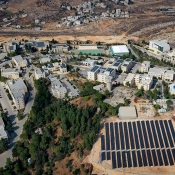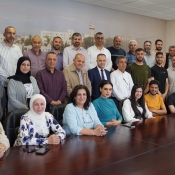The Birzeit Website First Year Retrospective Report: 6 June 1996 - 6 June 1997
Birzeit on the Web
Birzeit launched its website 1 year ago, on 6 June 1996, as a new information medium for the dissemination of material on the university and wider Palestinian society. Our knowledge of the Web at the time was not particularly broad, but immediate and positive reaction from our friends around the world motivated us to carry on developing the content of the website. The early days were modest, with 1,000 visitors the first month. Since then things have changed considerably. Top of Page
Monthly Visits to the Birzeit Website since June 1996 launch

Note that the two discernible increases in the levels of visits took place in October 1996 and in April 1997. Both of these jumps were the result of putting news-style information on the server following the end-September tunnel clashes (below left) and the February/March Abu Ghnaim clashes. Although this may seem strange - even in Palestine - that a university public relations department would spend time cataloguing such events, note that the number of monthly visitors remained steady after the October leap.
This is due to the reputation that Birzeit is picking up as a reliable source of information on Palestine from inside Palestine. With only 81 websites in the country at present - most, small, static "brochure-type" websites, Birzeit is leading the way in content provision. People coming to see information about Palestine on our server are continuing on to read information about Birzeit University itself. When our website was first launched, we had no departments online. Today we have over 10, some with significant amounts of information.
As this reputation increases via this route of information provision, particularly once the Palestine Archive project gets going, we will have a direct access to new sources of institutional and financial support.
Publishing a website is a commitment to keeping the information available current, as well as regularly offering new information. A website with out-of-date information will quickly lose any regular readership it has built up, and will cause problems beyond the actual website itself. In addition, the flow of visitors through a website can be a tool for making new contacts and fundraising, something we hope to exploit in the future. It is a testimony to our success so far that - as evident from the graph above - our website has steadily increased its readership to a level of around 7,000 visits a month by the end of the year, with more expected in the future. This has positive implications for the university. Top of Page
A positive profile of Birzeit Birzeit was a focal point of international attention in the past, a phenomenon that peaked at the time of the Madrid Peace Talks, where 60 percent of the Palestinian delegation was made up of Birzeit faculty. This attention, that undoubtedly helped all areas of the university's work, has decreased in the period after the establishment of the Palestinian National Authority. Today, information technology is putting us back in that spotlight once, and Birzeit's focuses - justice, pluralism, democracy and tolerance - remain the same, and speak an important message in this current period.
The website has received a lot of media attention, focusing on positive aspects of the website and university - a Palestinian institution that is leading the way in information technology in the country; a website that covers the development of the Internet in Palestine; a website that is both innovative and dynamic. Media attention has come from the Arabic and Hebrew press, as well as international print and electronic media. The New York Times on the Web recommended our Complete Guide to Palestine's Websites (right) for further information and the Washington Report on Middle East Affairs has extensively covered our website as a whole. Articles have appeared in the Daily Telegraph, Ma'ariv, the Jerusalem Post, the Jerusalem Times, Al-Quds, and Al-Ayyam. Reports have been broadcast on the Canadian Broadcasting Corporation (CBC), German Public Radio, and Voice of Israel.
As in our other computer hardware technology, Birzeit has emerged as a local leader in the field of information technology. Training programmes are being developed to teach website production inside and outside of the university. Recently, Web publishing and hosting services are being offered to local businesses, something that will bring in an income to students and the Web Center itself. Finally, several funding proposals are in the pipeline to radically expand the project.
Specific roles of the Birzeit website >Feedback from the Birzeit website has given some indication of the kinds of role the website is filling. The site has clearly facilitated networking between Birzeit and international academics.
It has assisted visitors and researchers with contacting the university. The Web has attracted new friends of the university - journalists, academics, teachers, and both university and school students - and has kept existing friends of the university informed in a way that the English Newsletter - with its external circulation of 2,000 - was never able to. The Birzeit website is expanding to offer weekly news from the university, as well as archives of past publications and news.
The website has been used to advertise the availability of courses, in particular the Palestine and Arabic Studies programme, with some of the coming summer students finding out exclusively through the Internet.
The website has been used for campaigning. The extensive Human Rights Action Project's Academic Freedom First website was a focus for the successful international petition campaign in March (right). This website has demonstrated one of the key functions of the Web - the reduction in staff time spent answering personalised information queries - with inquirers being redirected to the website.
The website has acted as an advertisement to existing donors to Birzeit and a electronic funding brochure to attract new donors. The Web Center equipment appeal, launched six months ago, to date has attracted more than US$10,000 in donations. Other funding is currently being considered. The European Union, Netherlands Representative Office, USAID, and Swedish International Development Cooperation Agency are reportedly interested in the Palestine Archive project, to provide a new and locally-based Palestinian information source on the Internet. They are interested in the Palestinian Internet: as a medium of democratisation; to increase the free flow of information; cultural understanding and tolerance; and the development of human resources and skills - all of which are important tenets of the Birzeit philosophy.
Feedback
Over 100 e-mail messages are sent each week to [email protected], or 5,000+ a year. The messages cover a variety of issues: comments about the university and our work, arranging visits; funding-related correspondence; requests for further information about the university; networking - asking to be put in touch with Birzeit lecturers and departments; and positive comments about the website. The percentage breakdown of these subjects is shown below.
E-mail to the Webmaster: Subject Percentage Breakdown >
Cost of the website >Apart from the cost of the single staff member and minor overheads such as electricity, Birzeit's Web project has no significant other costs. Equipment is being collected for the Web Center through an active fundraising programme. In addition, revenue from advertising on sections of the website offering information about Palestine is being sought, and students are being trained to offer Web services to local companies. For every four websites produced by students, the Web Center can purchase a new Pentium computer.
The job of the webmaster >The webmaster is currently responsible for researching, collecting, writing, preparing, maintaining, and updating content about the university; encouraging Web-awareness amongst staff and students and encouraging input to the university website; answering mail related to the website; administration and fundraising; and training.
Webmaster-managed content of the website includes, Brief Information in English, French and German, with Dutch in process. It is hoped that, ultimaely, Brief Information will be available in all other European languages, Arabic and Hebrew. In addition, selected department homepages, the Palestine and Arabic Studies Programme website, information about the development of the Web in Birzeit and Palestine, the Complete Guide to Palestine's Websites, and university press release, newsletter and other archives.
Preparing material for the website involves typing, HTML markup, scanning and image manipulation. Maintenance of content includes sending files to the website, checking links, searching for relevant links, maintaining the server, keeping server access statistics, and directory maintenance.
Administration and fundraising includes liaison with the finance office regarding the World Wide Web Center account, writing and following up with funding proposals, writing a Web newsletter to increase awareness in the university, maintaining an electronic mailing list to inform people of developments on the website; soliciting and accepting advertising, equipment acquisition and maintenance, and general correspondence.
Training includes preparing training material, advertising courses, teaching courses, follow-up with students, and overseeing student Web projects. This is one area that could do with significant expansion, enabling staff and students to appropriate new skills for use in and outside the university.
The webmaster has additional duties including the publication of general information in English about the university, including Brief Information, Palestine and Arabic Studies Programme Brochure, Birzeit University Newsletter, and various press releases. Other work includes arranging itineraries for selected visiting groups; conducting campus tours and speaking to visiting groups; general university fundraising; dealing with public relations information requests; miscellaneous writing projects such as a recent entry for the Encyclopedia of Higher Education; information technology skills and equipment upgrading in the Public Relations Office; maintaining the university contacts database; fax and e-mail lists; liasing with other departments; organising special events; and general PR correspondence and administration.
Special projects that will occupy significant extra time in the future include the Birzeit endowment and fundraising appeal for US $30 million (website coming soon).
Currently, all areas of work specified above are suffering, as there is simply too much work to do. Yet the work must not just go on. It must expand.
Immediate Needs >Clearly, for the current work to be done and done well, it has become essential to seek the appointment of a second staff member to work with the Web project. This is currently being investigated. The Birzeit website is now the primary contact point for people seeking information about the university and is has significant implications for fundraising. In addition, to free up staff time for non-Web work, there is the need for a support position.
Future plans 
Equipment/resources fundraising: The equipment appeal from last September is still ongoing, with the idea that the future World Wide Web Center is equipped to allow students and staff working on Web-related projects access to the latest technology - scanners, digital and video cameras, powerful computers, colour printers, etc. The equipment will also allow staff to cover university and local events more completely and effectively, gaining important experience in publishing for the Web and the concept of content provision. The Web Library Appeal, for HTML reference books and magazines, is also still ongoing. Both these fundraising tracks are important to enable the Web Center to communicate benefits of IT to the university and wider community (right).
Project fundraising: Funds are being sought for several projects. The Palestine Archive proposal is the most critical in terms of Palestinian content provision. In addition, a democracy-focused project that aims to link local information and research centers with the Internet, is being submitted to donors. It is hoped that this project will encourage the sharing of information locally, both with other organisations and members of the Palestinian Legislative Council, as well as with all interested users of the Internet.
It has been a busy and successful year. Here's hoping next year will be even more fruitful!
Nigel Parry








